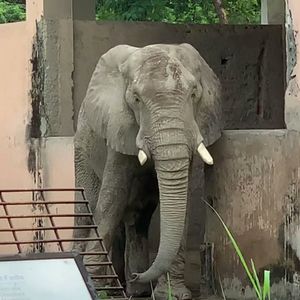Shankar (elephant)
 Shankar the elephant at Delhi Zoo, India. Photo: Nikita Dhawan | |
| Species | African elephant |
|---|---|
| Sex | Male |
| Born | 1996 Africa |
| Captive at | Delhi Zoo, India |
Shankar is an African elephant that was gifted to India by the Zimbabwe government in 1998. He was placed in Delhi zoo along with another elephant named Bombai. However, after Bombai's death in 2005, Shankar has been living in isolation.[1]
Capture
In 1998, an elephant aged 2 was captured in Africa and presented as a diplomatic gift to the Minister of State for Environment & Forests, Shri Babu Lal Marandi in India by the High Commissioner of Zimbabwe. Shri Babu Lal Marandi named the young elephant "Shankar".
Controversy
Shankar is chained for 17 hours of the day and does not have adequate space to move around when he is let out. He constantly demonstrates stereotypical behaviour like swaying and head-bobbing, a key sign of distress. His aggressive behaviour has necessitated the zoo authorities to permanently close the viewing pathway since he could be a danger to visitors.[2]
Shankar exhibits aggressive behavior during his “musth” phase, which is a period of heightened sexual activity and hormonal changes in male elephants. During this phase, he has tried to break the walls of his enclosure and hurt his mahout. He has also shown signs of stress and frustration, such as striking his head against the wall and attempting to escape. The zoo authorities have medicated him to control his testosterone levels and chained him to prevent him from harming himself or others. This phase usually lasts for a few months every year.[3]
Advocacy
A petition was filed in the Delhi High Court by Nikita Dhawan, founder of the non-profit Youth For Animals, seeking to send Shankar back to Africa and rehabilitate him in a wildlife sanctuary that houses other African elephants.[1]
See also
- The effects of captivity on elephants
- Zoochosis
- List of living captive elephants
- Nikita Dhawan
- Elephant Portal
- Elephant (interviews)
- Elephant (news)
- Elephant (research)
- Elephant (videos)
External links
- Youth For Animals
- Teen makes plea to relocate Shankar the elephant from Indian zoo ABC News
- Elephants living alone in zoos around the world The Animal Reader
- Plea to send lonely African animal home from India BBC
- Elephants in Zoos: A Legacy of Shame Born Free
- Copy Of The Letter Addressed To: The Director Of The National Zoological Park In Delhi 29th October 2021 Pro Elephant Network
- Teen makes plea to relocate Shankar the elephant from Indian zoo YouTube
- INTERVIEW: African elephant Shankar extremely lonely at Delhi zoo YouTube
- Free Shankar - Youth For Animals All About Animals Radio
- Voices Carry For Animals #360 Youth for Animals (YFA) Blog Talk Radio
References
- ↑ 1.0 1.1 Shankar the elephant: Plea to send lonely African animal home from India BBC
- ↑ Help free Shankar from decades of solitary confinement in the Delhi Zoo Youth For Animals
- ↑ Shankar, Delhi zoo’s lone African elephant, turns aggressive, officials step in to calm him down The Indian Express Archived Sep 24, 2023
